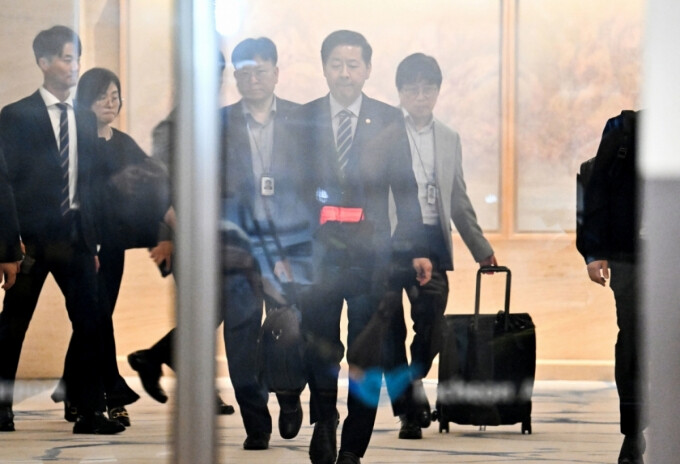
Washington D.C. Visit by Deputy Prime Minister Koo Yun-cheol Canceled at Incheon Airport; Treasury Secretary's Urgent Schedule Causes Collapse, Uncertainty Mounts as Negotiation Deadline Nears
With the August 1st tariff deadline just a week away, U.S.-Korea trade relations are facing an emergency. The "U.S.-Korea 2+2 Trade Talks," which were scheduled to be held in Washington D.C. on July 25 (local time), were suddenly canceled due to a unilateral notification from the U.S. side. Deputy Prime Minister and Minister of Economy and Finance Koo Yun-cheol, who had arrived at Incheon International Airport just before his scheduled departure for the U.S. to attend the talks, had to turn back after receiving the news 85 minutes before his flight was set to depart.
The Ministry of Economy and Finance officially announced on July 24, "The scheduled 2+2 talks with the United States on the 25th could not be held due to U.S. Treasury Secretary Scott Bessent's urgent schedule." It has been confirmed that the U.S. side sent an email to the South Korean government around 9 AM KST on the same day (8 PM on July 23, U.S. local time) stating that "it is difficult to hold the 2+2 trade talks." The email reportedly included multiple apologies and a request to reschedule the meeting as soon as possible.
The 2+2 trade talks were a crucial platform where Deputy Prime Minister Koo Yun-cheol and Trade Minister Yeo Han-koo from the Ministry of Trade, Industry and Energy were to meet with U.S. Treasury Secretary Scott Bessent and U.S. Trade Representative (USTR) Jamison Greer, respectively, to discuss mutual tariffs, specific product tariffs, and energy cooperation between the two countries. Especially given the U.S.'s announcement to impose reciprocal tariffs (a 25% tariff rate on South Korea) starting next month, after twice postponing them, these talks were considered virtually the last hurdle for resolving the tariff issue.
Notification Just Before Departure: Deputy Prime Minister Koo Yun-cheol Returns from Airport
Deputy Prime Minister Koo was scheduled to take Korean Air flight KE093 to Washington D.C. at 10:25 AM on that day. He arrived at Incheon Airport Terminal 2 and was waiting for his departure when he received the shocking news. Upon being informed of the cancellation, Deputy Prime Minister Koo immediately left the airport and returned. He is reportedly focusing on identifying the specific nature of Secretary Bessent's "urgent schedule" and the background behind the cancellation of the talks. It remains unclear whether this cancellation is merely a matter of scheduling adjustment or if there are more complex diplomatic or trade-related reasons behind it.
Tariff Negotiations: Uncertainty Mounts; Government Focuses on Rescheduling
The sudden cancellation of the talks, with the negotiation deadline looming, places a significant burden on the South Korean government's response. The unilateral notification from the U.S. side has further increased the uncertainty surrounding the tariff negotiations. Some analysts suggest that the U.S.'s action might be an attempt to gain an upper hand in the negotiations. The U.S. has been exerting trade pressure not only on South Korea but also on various other countries, including China, which is interpreted as part of a strong policy to protect its domestic industries and resolve its trade deficit.
Nevertheless, the activities of the high-ranking South Korean officials who have already departed for the U.S. for tariff negotiations will proceed as scheduled. Minister of Trade, Industry and Energy Kim Jeong-gwan and Trade Minister Yeo Han-koo plan to meet individually with Secretary of Commerce Howard Lutnick, USTR Greer, Secretary of Energy Chris Wright, and National Energy Council Chairman Doug Burgum to discuss mutual tariffs, product-specific tariffs, and energy cooperation between the two countries. This is seen as an effort by the South Korean government to broaden its engagement with the U.S. side as much as possible, even after the collapse of the 2+2 talks, to find a breakthrough in the tariff issue.
The Mystery of the U.S.'s 'Urgent Schedule': What's Next for Tariff Negotiations?
The exact nature of U.S. Treasury Secretary Scott Bessent's "urgent schedule" has not yet been disclosed. The cancellation of high-level meetings like trade talks just before departure is unusual, leading to various speculations in diplomatic circles. Some suggest the possibility of Secretary Bessent's health issues, domestic political matters, or other sudden significant international developments. However, regardless of the reason, this cancellation is bound to impact the trust in trade relations between South Korea and the United States to some extent.
The government stated, "We are discussing with the U.S. Treasury and USTR to hold the 2+2 talks as soon as possible," strongly expressing its willingness to renegotiate. However, given the pressing deadline of August 1, the time available for resuming negotiations is limited. If the 2+2 talks do not materialize within the deadline, or if individual negotiations do not yield significant progress, there is a high probability that the U.S.-announced 25% reciprocal tariffs will take effect. This is expected to cause considerable repercussions for domestic industries and raise concerns about intensifying trade friction between the two countries.
The sudden cancellation of the U.S.-Korea 2+2 trade talks has further complicated the South Korean government's efforts to resolve the tariff issue. Attention is now focused on how the two countries will resume negotiations and overcome the challenges in the remaining week or so.
[Copyright (c) Global Economic Times. All Rights Reserved.]






























